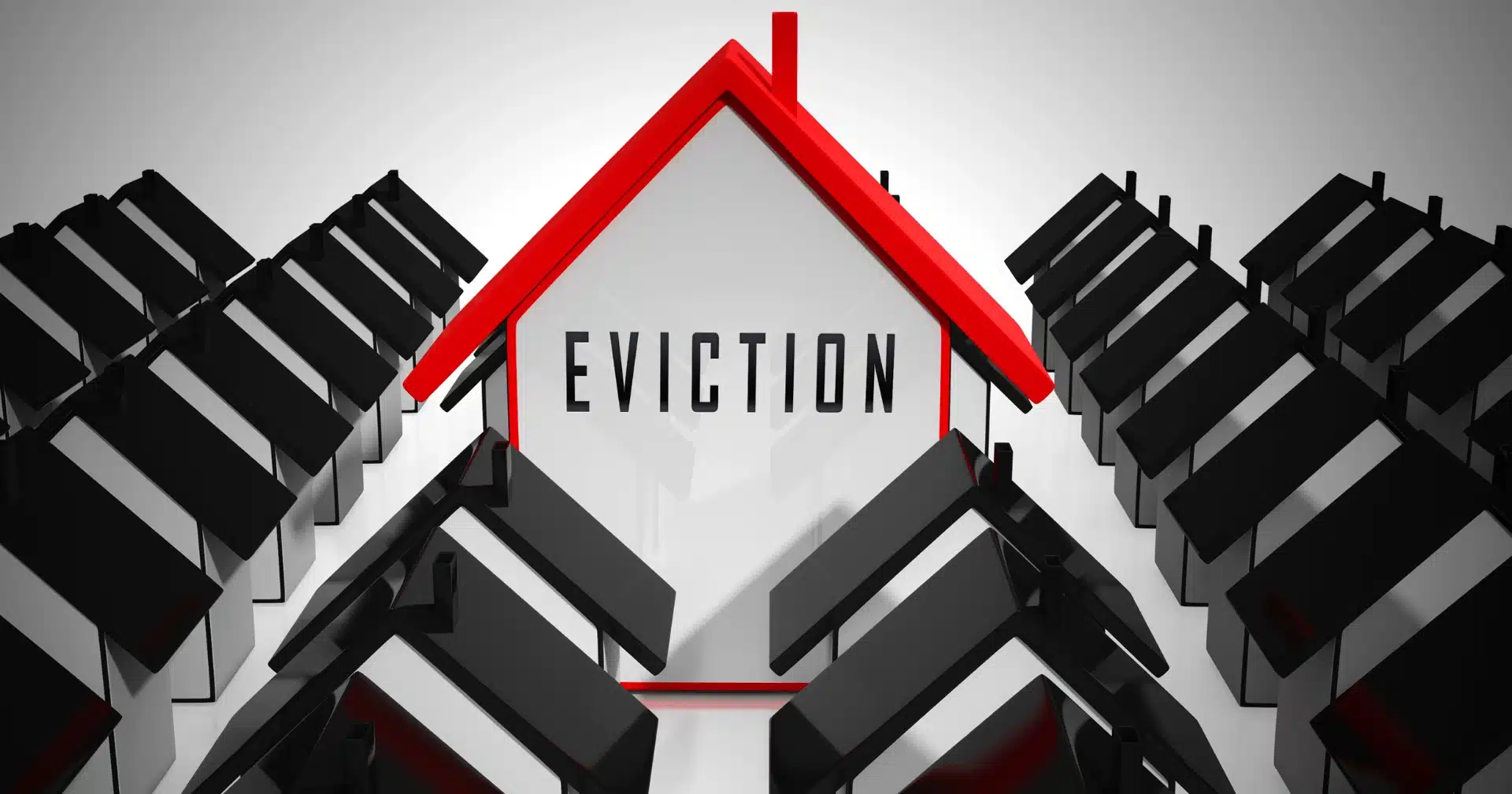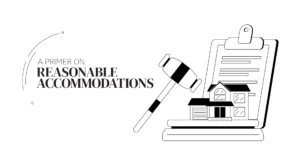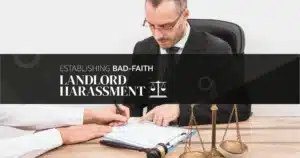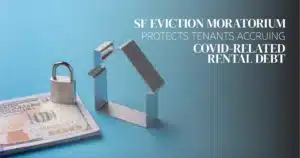Imagine you come home after a stressful day at work to find a notice on your door. It is an eviction notice, and you don’t know what you did wrong. You have paid your rent on time, and you have followed every rule in your lease.
It is an absolute nightmare, and for many tenants in California, this is the sad reality.
Evictions are always inconvenient, but wrongful evictions cause a financial burden, emotional stress, and put families at risk of becoming homeless. While there are laws in place to protect tenants from wrongful evictions by requiring landlords to provide a legitimate and recognized cause, this is not enough.
Tenants need to be educated about their rights so that when a landlord breaks the law, they can stand up for their rights. With the help of an experienced tenant rights attorney, you can not only challenge wrongful evictions but also recover damages and regain stability in your life.
What is Wrongful Eviction in California?
Eviction occurs when the landlord asks a tenant to vacate the property. A wrongful eviction takes place when a landlord doesn’t follow the legal procedure to remove a tenant from the property.
The most extreme examples are changing the locks, shutting off utilities, and removing belongings without going through any legal process. In many cases, the landlord attempts to convince a tenant to vacate without following the law by issuing a noncompliant eviction notice based on invalid grounds, often without proper notice. If your landlord has done any of these things, you are facing wrongful eviction.
Under California law, most landlords must have a valid legal reason, known as “just cause,” to evict a tenant. Common causes include non-payment of rent or a serious lease violation. There are eviction protections for most tenancies at the state level. In many cases, a tenant’s local rights under a city ordinance may be greater than the protections afforded under state law. The state’s Tenant Protection Act (AB 1482) covers many properties built more than 15 years ago, but some rentals are exempt, such as newer buildings, single-family homes with proper notice, and owner-occupied duplexes.
Landlords must clearly state the reasons in the eviction notice. Skipping any of these steps can make the eviction process unlawful.
As a tenant, you must know your rights and be able to tell if the eviction notice complies with the law. Tenants may be entitled to compensation if they can prove wrongful eviction. These damages cover moving costs and emotional distress. In some cases, you can receive punitive damages. For example, California Civil Code §789.3 allows tenants to recover actual damages and up to $100 per day, with a minimum of $250, for illegal lockouts or utility shutoffs. Some local ordinances, such as San Francisco’s Rent Ordinance §37.10B, also allow tenants to recover three times their actual damages plus attorney’s fees for certain wrongful eviction or harassment cases.
Common Scenarios Leading to Wrongful Eviction
If you are unsure whether your eviction is considered wrongful, here are some scenarios that can help you understand what may count as a legal violation.
Unlawful Lockouts
If you find yourself unable to enter your apartment because the lock has been changed, or the entry to the building is blocked, this is unlawful. Landlords sometimes remove a tenant’s belongings to force them out.
This is considered an illegal ‘self-help’ eviction.
Eviction Without Proper Notice
Eviction under California law requires a written notice before the process starts. The eviction process must follow specific legal steps. Landlords must first give written notice to the tenant. If the tenant does not comply, the landlord must then file a court case, called an “unlawful detainer,” to legally remove the tenant. A text message informing the tenant that their tenancy has been terminated, or that their lease is expiring or has expired and will not be renewed, is illegal under many circumstances.
This notice usually gives the tenant time to vacate the property and find a new place to live. If the tenant is asked to leave without notice, it not only causes immense stress but also violates the lease agreement.
Retaliatory Eviction
Landlords cannot evict tenants to punish them for exercising their rights. If you were served with an eviction notice after reporting unsafe living conditions or requesting reasonable accommodations, this is considered retaliation. You may be entitled to compensation if that is the case.
Understanding Compensation for Wrongful Eviction
If you have been forced out illegally by your landlord, you can challenge the eviction and pursue compensation. This legal remedy holds landlords accountable.
Here are some of the most common types of compensation:
Monetary Damages
Tenants may be awarded damages for the financial losses and distress caused by the eviction. This includes emotional distress from the stress and anxiety of displacement, securing alternative housing, moving costs, or paying higher rent for a new unit.
Moving Costs
Another type of compensation you can pursue is for last-minute moving expenses. This includes rental truck fees, storage costs, application fees, and paying for a new apartment.
Emotional Distress (If Applicable)
Wrongful eviction affects tenants on many levels. It is not just about money.
These damages cover stress, anxiety, disruption to one’s life, and, in some cases, compensation for wrongful displacement.
Legal Process to Claim Compensation
If you want to seek justice after a wrongful eviction but don’t know where to start, here are the steps that can make the process less intimidating.
Filing a Claim in Court
Tenants who have been served wrongful eviction notices can file a lawsuit against their landlord. They can do this with the help of a tenant rights attorney.
Gathering Evidence
The next step is to collect all the evidence that can be used in this case. You must document all your interactions with the landlord for legal purposes. Here are examples of useful documentation:
- Copies of the lease agreement
- Written or text messages with the landlord
- Eviction notices
- Photos or videos of lockouts, property removal, or unsafe conditions
- Witness statements, if available
- Documentation allows you to prove that the eviction was unlawful and it also helps you claim damages.
Working With a Tenant Rights Lawyer
While it is possible for you to file this claim on your own, an experienced tenant rights lawyer can make the process far more effective. Lawyers know how to build strong cases, they can negotiate with landlords, and they also fight for you to receive maximum compensation.
If you are ready to take the next step in holding your landlord accountable, contact The Law Firm for Tenant Rights, Inc. We ensure that our clients recover financially and emotionally from the disruption caused by wrongful evictions.
Schedule a free consultation with us today.
Frequently Asked Questions
- What is considered a wrongful eviction in California?
A wrongful eviction is when the landlord forces a tenant out without following the legal procedure, such as not giving proper notice, recovering possession in retaliation for complaints about habitability conditions, or shutting off utilities.
- Can my landlord change the locks to make me leave?
No, landlords cannot change the locks in an attempt to force you to leave. This is an illegal self-help eviction, and you can sue your landlord if this happens.
- What are my rights if I’m wrongfully evicted?
You have the right to challenge a wrongful eviction and seek compensation for the loss of your unit, increased rental costs, moving costs, and emotional distress.
- How much compensation can I get for wrongful eviction?
Your compensation depends on your losses and how high your rent was. You can also add moving fees, lost wages, and emotional distress to your damages.
- Do I need a lawyer to file a wrongful eviction claim?
You don’t need a lawyer to file a wrongful eviction claim, but you can benefit from the experience and knowledge that a tenant rights lawyer possesses.
- How do I prove wrongful eviction?
You need to collect evidence such as your lease, eviction notices, text messages, photos, and videos to show whether or not your landlord broke the law.
- Can I file a claim in small claims court?
Yes, you can file a claim in small claims court in California if your damages are $12,500 or less, or $6,250 if you are filing on behalf of a business or LLC.
- What if my landlord evicts me in retaliation?
Retaliatory evictions are illegal and may entitle you to additional compensation.
- Does discrimination count as wrongful eviction?
Yes, eviction based on race, religion, disability, and the like violates state and federal housing laws.
- How long do I have to file a wrongful eviction claim?
You must file a wrongful eviction claim within the statute of limitations, which varies depending on the damages sought. To determine the best time to file a lawsuit, speak with a tenant rights lawyer.





